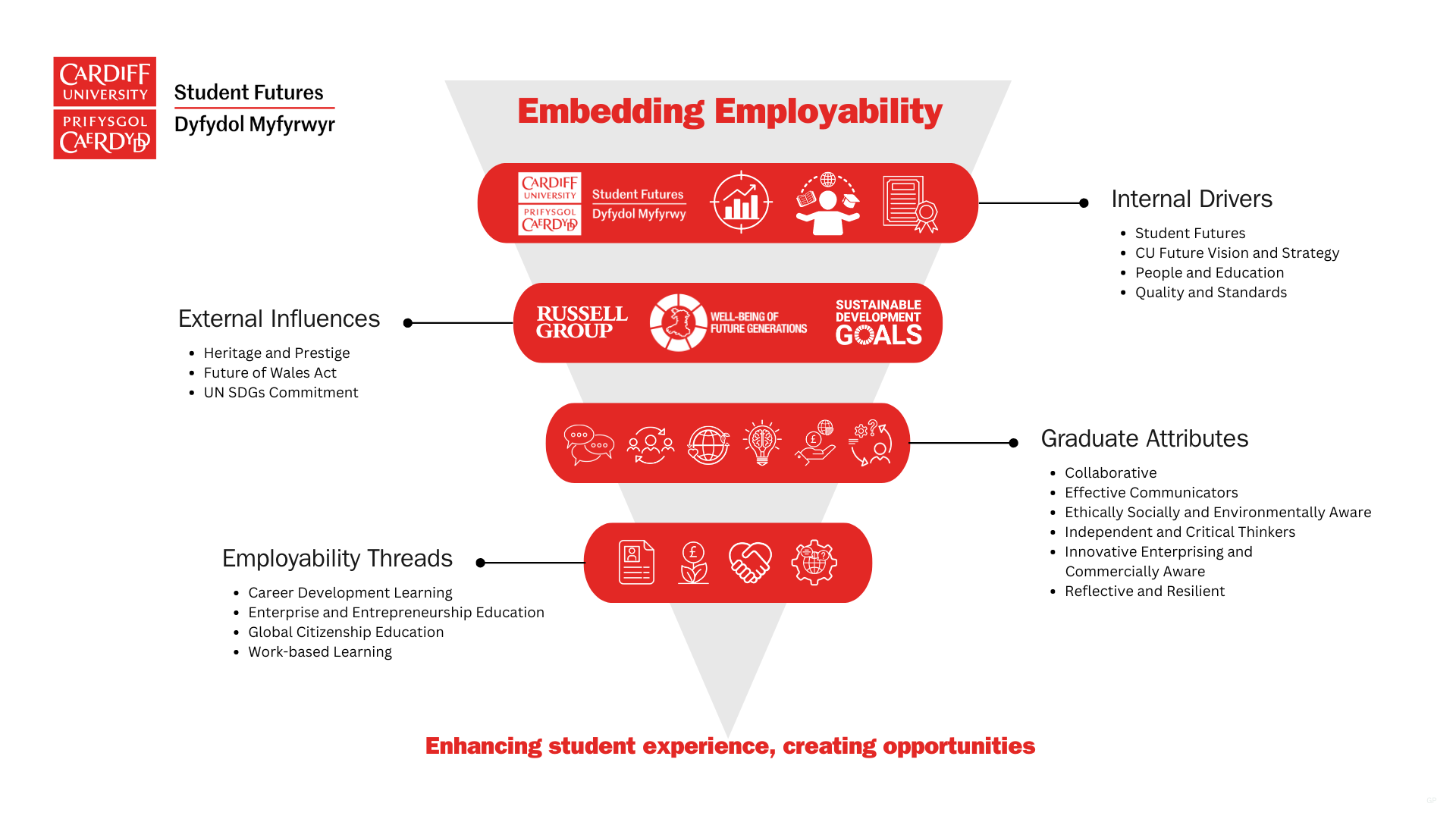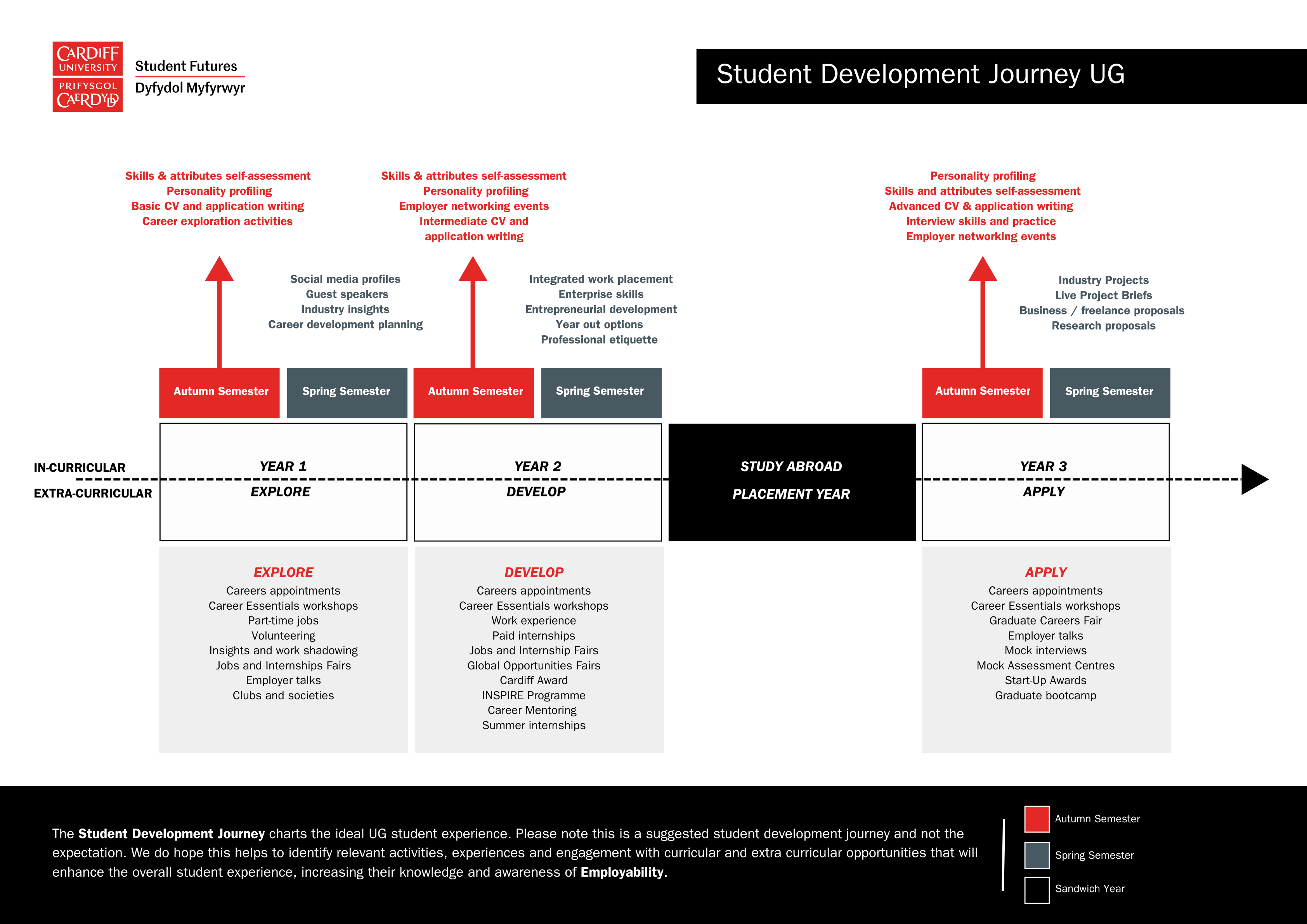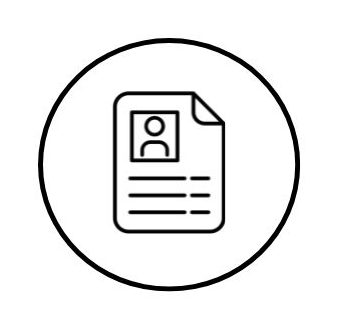Embedding Employability at programme level
Information, guidance and resources for embedding employability at a programme level
This section aims to provide programme leads with information and questions to consider when reviewing your employability provision from a programme perspective and includes a range of useful resources that can aid your planning and design.
Considering who you want your students to be
In your approach to the ongoing design and evolution of your programme, we recommend you consider some initial questions that might help steer your thoughts and indeed programme towards successfully embedding employability:
- What ‘type’ of student do you hope to graduate from your course?
- What knowledge, skills and attributes does that graduate possess?
- If the end goal for the student is to become ‘employable’ then what needs to happen to ensure this is achievable?
- What additional value has been designed and developed in their learning that will enhance their experience, increase their knowledge and support them in becoming employable graduates on completion of your programme?
- What are graduates from my programme going on to do?
Creating a programme that capitalises on the combined skills, knowledge and expertise of your team, with support from Student Futures and the Learning Teaching Academy, you will begin to leverage your programme and differentiate it from competing universities.
To differentiate, you need to create added value for students, through their learning and student experience. Added value can be created by developing and designing a programme that considers the user experience, it moves beyond academic rigour and knowledge by successfully integrating enhanced experiences and transferable skills that are adaptive to the working environment.
Understanding what your graduates go on to do
As outlined in the previous section, Graduate Outcomes measures are becoming increasingly important for attracting and recruiting students and satisfying the requirements of regulatory bodies. As such, it is crucial that programme staff have a basic knowledge of the Graduate Outcomes Survey.
The university’s Graduate Outcomes Dashboard provides access to all of the data, including graduate destinations, recruiting employers and survey response rates, broken down by School. Access the Dashboard below.
Staying up to date with relevant industry shifts and trends, the graduate labour market and graduate destinations will ensure the content of your programme remains fit for purpose, supporting the design and development of a curriculum that prepares students for their future careers and employment.
Understanding the institutional expectations regarding employability
As highlighted in the Student Futures Framework, here’s a refresher of the university’s institutional expectations and measures of success related to employability.
Cardiff University has established 15 University Success Measures (USMs), which will help to deliver our strategic priorities. They establish ‘how’ we measure our progress, the data we will use and the targets we’re aiming for.
USM 15 focuses on ensuring 'our student outcomes continue to be amongst the best in the sector' with the target of achieving top 10 performance in the Graduate Outcomes Survey;
"Using the Times Good University Guide 'Graduate Prospects' measure, we will achieve top 10 ranking at institution level for graduate outcomes".
Cardiff University has established 15 University Success Measures (USMs), which will help to deliver our strategic priorities. They establish ‘how’ we measure our progress, the data we will use and the targets we’re aiming for.
USM 7 focuses on ensuring 'we are recognised as one of the best universities in the UK and the world'
"We are a Top 100 University as measured by the QS World Rankings, and in the Top 20 of the Times Good University Guide as per the overall institutional ranking measure"
As part of the programme approval and revalidation process, all programmes must evidence how their learning, teaching and assessment supports the development of the university’s six Graduate Attributes. Programmes are required to map the attributes to their modules via an Employability and Graduate Attributes Review.
Given that the Graduate Attributes are part of the overall Cardiff offer, rather than a formal element of the ‘student contract’, the commitment is to guarantee that students will have the opportunity to develop the attributes, not that they will have acquired them upon graduation. As such, it is not expected that all programmes will have opportunities to develop all attributes via their curriculum. Where it is not possible or appropriate to integrate them, programmes need to ensure that students are signposted to relevant extracurricular activities provided by the wider university.
The Student Futures College Business Partners support Schools undergoing the approval and revalidation process. Learn more about Student Futures’ role and how the Business Partners can support you.

Llinos (PSE Business Partner) has been instrumental in working with us in CHEMY to develop our curriculum with Graduate Attributes at the forefront of the redesign. We have undertaken mapping exercises which have highlighted areas of strength and areas needing attention. With this in mind we’ve then redeveloped a year 2 module to pull this activity together into an attractive offering for 2024/25 in guise of a 3-day symposium type of event for the cohort. Without their input it would not be the exciting, engaging, and valuable product that has been created. We love working with Student Futures and their help has been key in making this old module new, fresh, relevant and impactful.
An approach to embedding employability
There is no one set way to embed employability in the curriculum and there are an array of frameworks and models that exist to support educational institutions in doing so. The Student Futures Framework sets out the institutional approach to embedding employability into the student experience via curricular and extracurricular activities.
For the purpose of supporting programme teams to embed employability explicitly within the curriculum, Student Futures has developed a simple concept called the Employability Threads. There are four threads, encapsulating a broad range of employability related education that if integrated throughout your curriculum, will enhance the learning experience for your students and help them to develop skills and attributes they need to succeed in the world of work.
The Employability Threads are:

Please click on the image above to view in Full Screen. If you would like to use the Employability Thread icons, you can download this file.
Career Development Learning
Career development learning is defined as:
“The acquisition of capabilities that are useful to the lifelong development and management of one’s career, grounded in an ongoing authentic learning-based process that builds knowledge of the world of work and one’s self. This process develops the learner’s ability to make sense of and synthesise this knowledge, and form the basis for effective decision-making relating to career choices, professional development and career building activity including work acquisition”.
To effectively embed Career Development Learning, you will need to ensure that students have opportunities to develop in line with the following learning objectives:
- Self-awareness – critically reflect on personal skills, attributes, values and motivations to shape a professional identity and develop prospective career goals.
- Opportunity awareness – demonstrate knowledge of the graduate labour market and career options, applying networking and self-promotion skills to attract recruiters.
- Decision making – create career development plans to set clear goals and actions, applying career management strategies to navigate the ever-changing future of employment.
- Transition learning – identify and engage with a range of professional recruitment methods that are reflective of industry practices, demonstrating an ability to adapt to the world of work.
Enterprise and Entrepreneurship Education
For some students, the transition into the world of work will involve them in a business start-up or social enterprise programme. An entrepreneurial mindset is also recognised by employers as adding value to the development of an organisation.
QAA (2018) has defined Enterprise as:
“The generation and application of ideas, which are set within practical situations during a project or undertaking… It combines creativity, originality, initiative, idea generation, design thinking, adaptability and reflexivity with problem identification, problem solving, innovation, expression, communication and practical action”.
and Entrepreneurship education as:
“Entrepreneurship Education is defined as the application of enterprise behaviours, attributes and competencies into the creation of cultural, social or economic value. This can, but does not exclusively, lead to venture creation. Entrepreneurship applies to both individuals and groups (teams or organisations), and it refers to value creation in the private, public and third sectors, and in any hybrid combination of the three”.
To effectively embed Enterprise and Entrepreneurship Education, you will need to ensure that students have opportunities to develop in line with the following learning objectives:
- Entrepreneurial skills, mindset and creative thinking - Identify, develop and analyse essential enterprise skills and attributes required to be an entrepreneur, applying creative and innovative practice.
- Freelancing, networking and digital profiles - Demonstrate how to start up as a freelancer, developing professional networks and digital profiles that support the creation of a successful, sustainable business.
- Setting up a business - Identify and apply the key aspects of how to develop and establish a business, from an initial idea or concept to a functioning model.
- Pitching and promoting - develop essential skills to pitch a business idea or concept with impact, applying a wide range of marketing tools and techniques available to advertise and promote it.
Global Citizenship Education
Cardiff University recognises the importance of students acting as global citizens, engaging with and valuing cultural difference via internationally focussed learning and teaching and/or through practical experience of other countries.
The United Nations (UNESCO, 2014) defines Global Citizenship Education as:
“Nurturing respect for all, building a sense of belonging to common humanity and helping learners become responsible and active global citizens. It is a form of civic learning that involves students’ active participation in projects that address global issues of a social, political, economic or environmental nature”.
To effectively embed Global Citizenship Education, you will need to ensure that students have opportunities to develop in line with the following learning objectives:
- Global awareness and cultural competence - identify and analyse key global challenges whilst developing an increased awareness for cultural diversity and how cultural differences can impact international relations.
- Global citizenship values and social responsibility - develop and apply the values and behaviours associated with being a responsible global citizen; promoting social responsibility, making ethically informed decisions, and understanding the positive influence individuals and organisations can have when addressing global issues.
- Sustainability and environmental leadership – identify and demonstrate sustainable practices and environmental leadership at a local, regional and or global scale.
- Community engagement – actively participate in community engagement opportunities and projects that align with one or more of the United Nations Sustainable Development Goals (SDGs), developing a greater awareness of the importance such initiatives have when tackling global challenges.
Work-Based Learning
For students to effectively bridge the gap between academic knowledge and real-world application and develop essential skills required by employers, it is crucial that they learn from practical experiences whilst at university.
“Learning through work, learning for work and/or learning at work. It consists of authentic structured opportunities for learning which are achieved in a workplace setting or are designed to meet an identified workplace need. This type of learning typically has a dual function of being designed to meet the learning needs of the employees, developing their knowledge, skills and professional behaviours, and also meeting the workforce development needs of the organisation”.
Integrating work placements into the curriculum is also an important aspect of the Student Futures Framework, with half of undergraduate students expected to complete a placement as part of their studies.
To effectively embed Work-Based Learning, you will need to ensure that students have opportunities to develop in line with the following learning objectives:
- Applied learning – apply and demonstrate relevant practice, skills and knowledge developed in the learning environment, that are applicable to a simulated or real-world work environment.
- Industry knowledge – develop a comprehensive knowledge of industry-specific practices, commercial awareness and sector or subject specific challenges.
- Critical thinking and problem solving – identify and solve problems independently or as part of a team, applying creative and analytical thinking.
- Professionalism – demonstrate professionalism in the workplace, including effective communication, time management, adaptability, and adherence to workplace norms.
Watch this short video that introduces the threads and highlights the external influences that have shaped their development.
Access the Introducing The Employability Threads 1 transcript
By embedding the Employability Threads into your curriculum, you can be confident that your programme is providing opportunities for students to develop the Graduate Attributes, which have all been mapped to the threads.
The infographic below attempts to illustrate how contributing factors, influences and drivers have shaped our approach to Embedding Employability. We have consolidated internal drivers, external influences and our graduate attributes into four accessible and clearly defined employability threads.

Please click on the image above to view in full screen or download a copy.
Useful resources to support planning and design
Undertaking a holistic review
The Programme Review Guide below, based around the Employability Threads, may help programme teams to undertake a holistic review of your current approach to employability (if an existing programme) or to help structure a new approach (if creating a new programme).

I mapped the current MLO against the Graduate Attributes and it was only on completion of the process I realised that although we do groupwork / collaborative exercises and workshops they were not being drawn out / visible in any way in the learning outcomes. (Similar gaps were seen in the reflection and in communication – but the collaborative one was the most stark / surprising). As a result we adjusted not only the MLO to make explicit reference to collaboration (and also to lesser extent reflection and communication) but also reviewed and updated the assessments to include for the collaborative / groupwork element, to yes, make the golden thread from MLO to actual activities to assessment more explicit and authentic.
The ‘ideal’ student journey
Whilst we recognise that every student is different and will have different requirements at different stages during their time at university, we have created student development journey infographs below to help develop your awareness of the curricular and extracurricular activities that students could engage with at both undergraduate and postgraduate level. Whilst they depict an ‘ideal’ student journey, they are not expectations, and are simply intended to signal what and when in the academic journey students could be introduced to employability related opportunities and learning, both in and outside of the curriculum.
Student Development Journey UG

Please click on the image above to view in full screen or download a copy.
Student Development Journey PG

Please click on the image above to view in full screen or download a copy.
Curricular Activities Matrix
To assist with the development of your programme Student Futures has listed a range of curricular activities under each of the Employability Threads.
 Career Development Learning Career Development Learning |
 Enterprise & Entrepreneurship Enterprise & EntrepreneurshipEducation |
 Global Citizenship Global CitizenshipEducation |
Learning |
|---|---|---|---|
| Self-Assessment activities, e.g. Graduate Attributes assessment, personality profiling
Career exploration projects, industry-specific research and job market analysis Career / Professional Development Action Plan and / or Career Portfolio Integrated Cardiff Award Pathway (via Student Futures Account) Career Management strategies CV, cover letter and application writing Mock interviews and /or assessment centres Professional social media profiles e.g., LinkedIn Employer-led talks and networking events Employability skills development lectures Reflective journals, blogs and /or portfolios Professional skills, attributes and /or competencies as required by PSRBs or industry |
Business Plan development (groups or individual)
Social entrepreneurship projects Pitching competitions and /or Elevator Pitch exercises Market research and competitor analysis projects Integrated ‘Start-Up and Freelance’ Pathway (via Student Futures Account) Start-up simulations Prototype development and /or exhibition / demonstration production Business Model Canvas Entrepreneur-led talks and networking events Reflective journals, blogs and / or portfolios Enterprise and entrepreneurship skills development lectures
|
Global awareness projects based on live briefs and/or historic case studies
Role-play or simulation exercises e.g., a simulated Model United Nations conference Collaborative Online International Learning (COIL) projects with international partners Cultural Exchange Programmes with institutions in different countries Work or study year abroad via the Global Opportunities Team Short-term mobility projects abroad e.g. fieldtrips, research placements Community service projects Group debates or discussions Employer-led talks and networking events Reflective journals, blogs and / or portfolios
|
Integrated work placements or internships
Professional placement years (PPY) Workplace simulations or role-plays Industry research projects Site visits, Fieldtrips Job shadowing, work insights or taster days Mentorship programme Cross-cultural experiences, such as work abroad year or cultural exchange programme Industry-led talks and networking events Reflective journals, blogs and / or portfolios Professional training and / or qualifications as required by PSRBs or industry |
You can access and download a PDF of the Curricular Activities Matrix here.
Student Futures Events Calendar
Student Futures has many events, competitions and opportunities available for students that support their engagement with employability related themes and topics. We have developed this resource so that you can identify what opportunities you can align your programme studies with, E.G. 100 Big Ideas, an enterprise and interdisciplinary opportunity for students to engage with real world problems, to discuss and devise a solution collaboratively.
To view the Student Futures Event Calendar in full, click here.
To download a copy of the written content please click here.
The Student Futures Learning Resource Team is continuously looking to develop practical resources that include guides, activities, lesson plans and case studies to support staff in embedding employability in the curriculum.
If you are already delivering an activity or assessment that aligns with one or more of these threads and would be interested in sharing this with other academic and professional services staff, please complete the MS Form.
For more information, support and guidance please contact the Student Futures Business Partner for your College:
AHSS Jon Forbes ForbesJ3@cardiff.ac.uk
BLS Anneka Bisi BisiA@cardiff.ac.uk
PSE Llinos Carpenter CarpenterL1@cardiff.ac.uk
